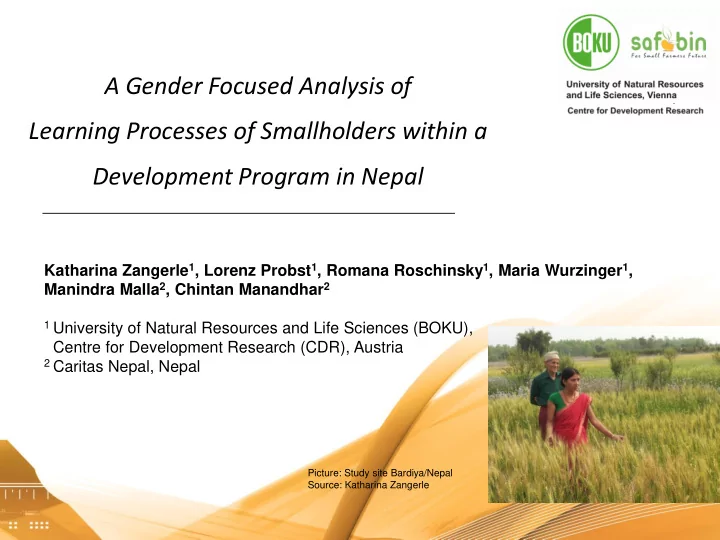

A Gender Focused Analysis of Learning Processes of Smallholders within a Development Program in Nepal Katharina Zangerle 1 , Lorenz Probst 1 , Romana Roschinsky 1 , Maria Wurzinger 1 , Manindra Malla 2 , Chintan Manandhar 2 1 University of Natural Resources and Life Sciences (BOKU), Centre for Development Research (CDR), Austria 2 Caritas Nepal, Nepal Picture: Study site Bardiya/Nepal Source: Katharina Zangerle
SAF-BIN key facts: Strengthening Adaptive Farming in Bangladesh, India & Nepal • Research and development program • Duration: 5 years; since 2011 • Objective: Promote local food and nutritional security through adaptive small scale farming in the context of climate change (SAF-BIN 2011) Katharina Zangerle 2
SAF-BIN in Nepal & Study Sites Kaski • SAF-BIN in Nepal: Surkhet 4 districts, 28 villages, 3-4 farmers groups/ village, about 15 persons/ group • Study Sites: Mixed farming systems, Nawalparasi subsistence- oriented Bardiya Bardiya: Mid western plains Kaski: Mid- hills Katharina Zangerle 3
Research Questions In which ways do the activities within SAF-BIN allow learning? Which learning outcomes are realized? In which way do these learning outcomes differ between men and women? Katharina Zangerle 4
Theoretical approach • Transformative Learning Theory Critical reflection, Dialogue, Individual experience are essential for learning Instrumental learning ....... gaining technical skills and knowledge Communicative learning … communication skills (Mezirow et al. 2009) • Gender perspectives Theory of practical and strategic gender needs (Moser 1993) Intersectionalities (Crenshaw 2004) Katharina Zangerle 5
Methodology – Qualitative design • 2-months field study Problem-centered interviews with SHFs (#22) and project staff (#11) Observation: living context and learning activities (group meetings, field trials) Field-work diary, records, photographs, transcription with software f5 • Analysis Descriptive statistics Content Analysis and Comprehensive Structural Analysis (Lueger 2010) with software Atlas.ti Katharina Zangerle 6
Results I: Gender distribution & learning activities • Group meetings Bardiya Kaski • Design of plots Female Male Female Male • Monitoring of field trials Group 1 13 2 14 1 Group 2 8 7 13 2 • Interpretation of results Group 3 13 2 13 3 These activities allow transformative learning through the Different age classes, ethnicities, participative character marital status and supportive project staff Katharina Zangerle 7
Results II: Instrumental learning outcomes Topic Learning outcomes Notable gender outcome Climate Change Knowledge about global and regional - Climate Change (CC), CC adaption, links between CC and farming Cultivation Use of different crop varieties/ Line Especially men practices/ sowing instead of broadcasting/ Inputs Application of organic fertilizers/ mulching Management IPM/ Water management/ Farm Especially men management Health Nutrients (application: cooking, kitchen Especially women learned gardening), Potential impacts of about health issues chemical pesticides and fertilizers on health Farming as Sell vegetables at market, business diversification and professionalization Katharina Zangerle 8
Results III: Communicative learning outcomes Topic Learning outcomes Notable gender outcome Planning Defining problems and short-term Especially women and long-term objectives Management Organization skills e.g. assign - functions of group members Communication Presentation skills and techniques, Especially women (except networking, decision making, self- for decision making!) confidence Analytical Analytical and methodological - capacities awareness Concepts Concepts e.g. sustainability, Especially empowerment, leadership, women gender equality, capacity building Katharina Zangerle 9
Conclusions Participative and regular activities & skilled facilitators support learning SAF-BIN can be a platform for transformative learning Men are more likely to achieve technical learning outcomes and women are more likely to achieve communicative learning outcomes Chances for learning and empowerment: e.g. adressing issues like postharvest handling of crops, animal husbandry, management of crisis, women in higher positions, motivating women for technical topics Further research: Which processes lead to inequalities? Katharina Zangerle 10
A Gender Focused Analysis of Learning Processes of Smallholders within a Development Program in Nepal Katharina Zangerle 1 , Lorenz Probst 1 , Romana Roschinsky 1 , Maria Wurzinger 1 , Manindra Malla 2 , Chintan Manandhar 2 1 University of Natural Resources and Life Sciences (BOKU), Centre for Development Research (CDR), Austria 2 Caritas Nepal, Nepal Picture: Study site Bardiya/Nepal Source: Katharina Zangerle This research has been produced with the financial assistance of the European Union. The contents of this document are the sole responsibility of Caritas Austria and its partners and can under no circumstances be regarded as reflecting the position of the European Union. European Commission 11
References Crenshaw, K. (2004): Intersectionality: The Double Bind of Race and Gender. Perspectives Magazine. (online): http://www.americanbar.org/content/dam/aba/publishing/perspectives_magazine/women_perspectives_Spring20 04CrenshawPSP.authcheckdam.pdf. [Abgerufen: 13.06.2015]. Duggan, L., Nisonoff, L., Visvanathan, N., Wiegersma, N. (2006): The Women, Gender and Development Reader. Sixth impression. Malaysia: Forum. Farming First (2013): The female facts of farming. (online) http://www.farmingfirst.org/portal/gender/. [Abgerufen: 25.01.2013]. Giro (2009): Food and Agriculture Organization of the United Nations (FAO) (2014): Fact Sheet Nepal. Women in Agriculture, Environment and Rural Production. (online) ftp://ftp.fao.org/sd/sdw/sdww/Nep.pdf [25.07.2014]. Lueger, M. (2010): Interpretative Sozialforschung: die Methoden. Wien : Facultas.WUV. Mezirow, J., Taylor, E.W. & Associates (2009): Transformative Learning in Practice. Insights from Community, Workplace and Higher Education. San Francisco: Jossey-Bass. SAF-BIN (2011): Strengthening Adaptive Farming in Bangladesh, India & Nepal (online) http://www.safbin.org/home. [Abgerufen: 30.10.2013]. Katharina Zangerle 12
Recommend
More recommend